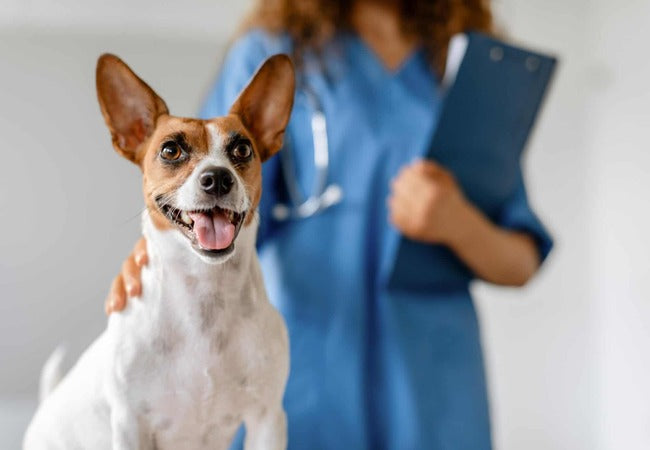Dog Fecal Tests in 2025: Complete Veterinary Guide 🩺🐾

In this article
Dog Fecal Tests in 2025: Complete Veterinary Guide 🩺🐾
By Dr. Duncan Houston BVSc
Hello! I’m Dr Duncan Houston BVSc, veterinarian and founder of Ask A Vet. Fecal testing may seem unappealing, but it’s vital for keeping your dog—and family—safe from intestinal parasites and infections. In this in-depth 2025 guide, we’ll explore why fecal tests are essential, test methods, costs, frequency, proper sample collection, result interpretation, and how Ask A Vet makes the process stress-free. Let’s help your dog thrive from the inside out! 🐶💙
1. 🎯 Why Fecal Tests Matter
Fecal exams detect parasites such as:
- Roundworms, hookworms, whipworms, tapeworms
- Coccidia, Giardia
- Infections like parvovirus, salmonella, Cryptosporidium
Parasites may cause diarrhea, vomiting, weight loss, or spread zoonotically to people. Puppies need multiple tests in their first year, and adults should have them at least yearly, more often if clinical signs or risk factors are present.
2. 🧪 Types of Fecal Tests
2.1 Fecal Flotation
Common technique: mix stool with flotation solution, centrifuge, then microscopy reveals eggs/protozoa. Quick (≈20 min) but may miss intermittent shedding.
2.2 Fecal Smear
A small drop examined under a microscope—useful for motile protozoa but less sensitive than flotation.
2.3 SNAP / Antigen Tests
Point-of-care kits for Giardia or parvovirus antigens. Results in minutes but can show false positives after vaccination.
2.4 PCR Panels (OVA & Giardia)
Advanced tests detect DNA from parasites like Giardia and Cryptosporidium. More sensitive and may cost $60–100.
2.5 Culture & Specialty Tests
Used for bacteria like Salmonella or Cryptosporidium; referral labs, higher complexity.
3. 💵 Costs in 2025
| Test Type | Typical Cost (USD) |
|---|---|
| Fecal flotation | $25–45 |
| SNAP Giardia/parvo | $40–75 |
| PCR panel | $60–100+ |
| Culture & specialized | $30–150 |
Cornell lab: flotation $27, Giardia ELISA $36, PCR $36. Clinics often quote $25–75 standard fee. Higher-end PCR may be $59 initially, $39 for follow-up.
4. 📆 Testing Frequency & When to Test
- Puppies: 4 times in first year
- Adult dogs: At least annually, ideally biannually; more often if diarrhea, outdoor exposure, kenneling, or daycare
- Post-antiparasitic treatment: Re-test 2–3 weeks later to confirm efficacy
- Before boarding/breeding: Required by many facilities
5. 🧾 Sample Collection Guide
- Harvest fresh stool (≤24 hours old), about 1 tsp
- Avoid contamination (grass, dirt, litter)
- Collect with clean tools—bags, containers provided by the vet
- Refrigerate only if >1 hour before submission; don’t freeze
- If the owner is unable, the vet tech may collect using a fecal loop from the rectum
6. ⏳ Turnaround & Follow-Up
- In-clinic SNAP or flotation: results in 10–30 minutes
- Lab tests (PCR/culture): usually results in 1–3 days
- Positive results treated with targeted dewormers (fenbendazole, praziquantel, metronidazole, etc.)
- Recheck after 2–3 weeks to ensure cure and evaluate parasite prevention strategies
7. ⚠️ Risks & Limitations
- False negatives common if parasitic shedding is intermittent
- SNAP tests may show false positives post-vaccination
- PCR may detect DNA of dead parasites—clinical correlation needed
- No sedation needed; non-invasive and safe
8. 🛡️ Prevention & Health Strategy
- Follow a monthly deworming schedule and year-round parasite prevention
- Pick up and dispose of stool daily—reduces exposure
- Practice good hygiene—wash hands after handling stool
- Re-test after treatment and before boarding or interactions with vulnerable pets or people
9. 💡 Ask A Vet & Support
- Ask A Vet: Telehealth advice on testing options, interpreting results, and medication guidance
- Stool collection kits, parasite control plans, and comforting supplements
- Reminders for test scheduling, log stools, medication tracking, and follow-up alerts
10. ✅ Final Thoughts
Fecal testing is a frontline tool for keeping dogs—and families—healthy. In 2025, these tests are affordable ($25–100), non-invasive, and essential. By regularly screening, effectively treating, and using smart systems like Ask A Vet and, you can confidently protect your dog from hidden parasites and zoonotic risks. Let’s keep every wag safe and healthy! 🐶💙
Need handy stool tracking templates, treatment schedules, or parasite prevention guides? Visit AskAVet.com, browse home kits, and track health with. Happy & parasite-free days ahead! 🌟






